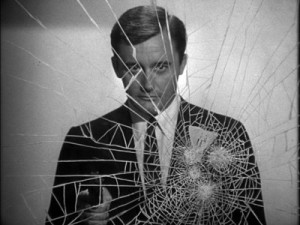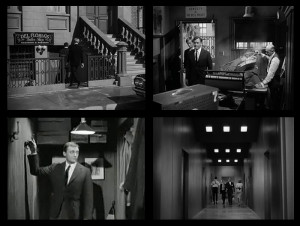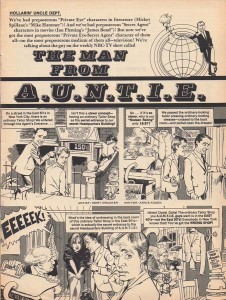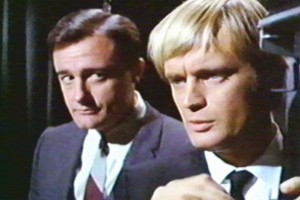When I now think of The Man from U.N.C.L.E. TV series (1964-1968), it is as a toy, a plaything of youth. As with most toys, I locked the show away in a high, hard-to-reach corner of my crowded memory bank. I’ve taken it down a couple times in recent years through Netflix and assorted snatches on YouTube and, as you’d expect, it looks a lot smaller, even chintzier than it once did. But I also think it deserves a reassessment more nuanced than the too-casual shorthand even fans of the show use to dismiss what, for a brief time, was a legitimate pop-culture phenomenon.
When, for instance, people lazily describe U.N.C.L.E. as a “Cold War spy spoof”, they’re wrong in several shades of the same color. In the first place, labeling Napoleon Solo (Robert Vaughn) and Ilya Kuryakin (David McCallum) as spies is as imprecise as labeling James Bond a spy. All three are international cops. Period. (Doctor No pegged Bond more or less correctly at the start of his movie career as a “stupid policeman.”) This made U.N.C.L.E. less a spy show than another cop show (or a western in business suits) only with outlandish (if often prescient) technology and even more outlandish villains.
Frame such factors with series co-creator Sam Rolfe’s deadpan-earnest establishment of the ersatz United Network Command for Law Enforcement (appreciation for whose cooperation in each episode’s closing credits prompted job applications from credulous eight-year-olds of all ages) and you have a show that was less an outgrowth of the espionage genre and more like science fiction, an alternative depiction of the mid-sixties in which the whole USA–USSR Cold War back-and-forth poses less of a threat to the human race than lone-wolf maniacs, bonded by some bureaucratically-arranged netherworld labeled THRUSH, who try to outdo each other in threats of mass destruction and/or global domination.
Indeed, when I think back to the sociopaths targeted by U.N.C.L.E.’s rainbow coalition of sharply-dressed “enforcement agents,” it’s less reminiscent of the bad old days of Imperialist Dogs Toe-to-Toe Against Commie Ratfinks and more akin to the bad new days of free-lance terrorists and renegade masters-of-the-fiscal-universe who wont let anyone stop them from making themselves richer and everybody else poorer – or worse. Is it possible that a nearly fifty-year TV program could offer clues as to how to at least put up a cool front against up-to-the-minute peril?
Some of the recurring gimmicks retain their modest appeal, even when they seem less credible than ever. That “ordinary tailor’s shop” in Manhattan’s East 40s that served as covert access to U.N.C.L.E. headquarters may have been the worst-kept secret in New York City. Some bad guys broke through the dressing room door in the very first scene of the very first episode. And after that, nobody thought of changing location in four seasons? Really? And you mean to tell us that none of those hapless civilians drafted for world-saving duty (especially in the first season) who dropped by the office for a gentlemanly pat on the back from U.N.C.L.E.’s stiff, avuncular COO Alexander Waverly (Leo G. Carroll) ever told their friends and family what that dressing-room hook did when the signal was given? There had to have been a front entrance, nondescript of course, for office-supply salespeople and take-out lunch deliveries – though the United Network Command etc. might well have been as much a trailblazer for today’s well-endowed employee cafeterias as it was for cellular communication. I’m already thinking too much here. This MAD parody, a sweet-little relic of its own kind, captured all the first-season absurdities as well as I can.
I’d never known this, but at the very beginning, the idea was that each week U.N.C.L.E. agents would somehow wander into the life of a hapless civilian who would, either willingly or not, tumble through the looking glass into this aforementioned alternative universe of private militias, mountain garrisons, chemical weapons, psychological warfare and apocalyptic tactics. Even after this formula wore off after a season or so, it was responsible for Man from U.N.C.L.E.’s better episodes. You liked having someone who wasn’t in on the game wandering around this arcane world on your behalf partly because, as droll, charming and adroit as Vaughn and McCallum were in playing their respective roles, Solo and Kuryakin were basically well-tailored ciphers. Napoleon Solo remains the coolest name ever given to a TV action hero, thanks to Bond’s creator Ian Fleming, who the producers brought in at the start for suggestions. But Napoleon (“Nappy Spice” would now be his new-jack moniker) was little more than a jumble of mannerisms encased in two-button suits with a suave-but-chilly intellect, somewhat reminiscent of the recently deceased John F, Kennedy. Maybe that was enough to keep us in Solo’s corner for those four seasons. But I now wish Fleming had left behind a better idea of who this Solo guy was and where he came from. Somewhere among the online clutter, there was something about him being Canadian. That wasn’t going to fly on American network TV in the early-to-mid-1960s, when it was OK for leading men to be Canadian – Dig that crazy Raymond Burr and who the hell is William Shatner?!? – but not leading roles.
(Most, but not all, of these notions – especially the absence of a back story for Napoleon Solo – are addressed in the new Guy Ritchie movie, about which I shall say nothing more except that it’s better than you’d expect it to be — even if you expect it to be just as it was when it was your favorite toy. Which it wont be. But that’s not our topic for today. So where were we?)
You know what else I wish? And this is nothing against McCallum, who managed to bring intriguing flashes of temperament into Ilya’s characterization. I wish the show had followed another of Fleming’s original suggestions and partnered Napoleon with a woman. Her name was supposed to be April Dancer, which was used as the title character’s name in the puerile spinoff, The Girl from U.N.C.L.E. In a more far-sighted and progressive age of TV when networks weren’t concerned with offending white viewers in the Deep South, it wouldn’t have been too out-of-line for the producers to cast a woman-of-color in the role. Any number of beautiful, magnetic actresses could have made the grade at that time; to name only a few, Diana Sands, Rita Moreno, Abbey Lincoln, Diahann Carroll, France Nuyen, Eartha Kitt, Nichelle Nichols or even Dorothy Dandridge, who back then was in dire need of a fresh new break. This Man From U.N.C.L.E. could have broken the barrier that I Spy breached a season later while giving Americans their own urbane, witty and altogether transformative version of British TV’s The Avengers. Anything’s possible in alternate universes, even my suggestion a year ago of a different lead for Hawaii Five-O. But if even the remakes and updates we’ve been seeing of these shows are any indication, producers’ visions still go only so far, and no farther.




